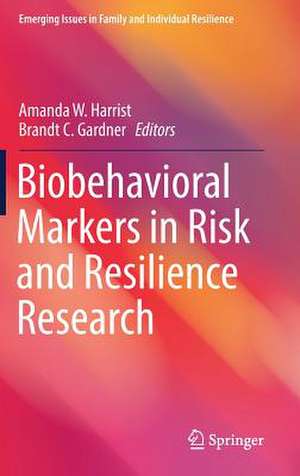Biobehavioral Markers in Risk and Resilience Research: Emerging Issues in Family and Individual Resilience
Editat de Amanda W. Harrist, Brandt C. Gardneren Limba Engleză Hardback – 4 apr 2019
This comprehensive reference explores the current and future state of biobehavioral markers in family resilience research, with special focus on linking biological and physiological measures to behavioral and health outcomes. It brings together the latest biobehavioral data on child-parent and couple relationships, adversity, and other key areas reflecting new technological advances in biobehavioral studies and translates these findings into implications for real-world practice and policy. The contributors’ insights on biomarkers apply to emerging topics of interest (e.g., molecular genetics) as well as familiar ones (e.g., stress). Their interdisciplinary perspective helps to elaborate on risk and resilience factors for those creating the next generation of evidence-based interventions.
Among the topics covered:
- The immune system as a sensor and regulator of stress: implications in human development and disease
- The psychobiology of family dynamics: bidirectional relationships with adrenocortical attunement
- Intergenerational transmission of poverty: how low socioeconomic status impacts the neurobiology of two generations
- The influence of teacher-child relationships on preschool children’s cortisol levels
- Challenges and strategies for integrating molecular genetics into behavioral science
Besides its worthto researchers and practitioners studying and working with families at risk, Biobehavioral Markers in Risk and Resilience Research also has utility as a training text, offering a highly accessible presentation and discussion questions suited to classroom use.
Preț: 388.52 lei
Nou
Puncte Express: 583
Preț estimativ în valută:
74.37€ • 80.81$ • 62.51£
74.37€ • 80.81$ • 62.51£
Carte tipărită la comandă
Livrare economică 21 aprilie-05 mai
Preluare comenzi: 021 569.72.76
Specificații
ISBN-13: 9783030059514
ISBN-10: 3030059510
Pagini: 182
Ilustrații: XIII, 161 p. 7 illus.
Dimensiuni: 155 x 235 mm
Greutate: 0.43 kg
Ediția:1st ed. 2019
Editura: Springer International Publishing
Colecția Springer
Seria Emerging Issues in Family and Individual Resilience
Locul publicării:Cham, Switzerland
ISBN-10: 3030059510
Pagini: 182
Ilustrații: XIII, 161 p. 7 illus.
Dimensiuni: 155 x 235 mm
Greutate: 0.43 kg
Ediția:1st ed. 2019
Editura: Springer International Publishing
Colecția Springer
Seria Emerging Issues in Family and Individual Resilience
Locul publicării:Cham, Switzerland
Cuprins
The Immune System as a Sensor and Regulator of Stress: Implications in Human Development and Disease.- The Psychobiology of Family Dynamics: Bidirectional Relationships with Adrenocortical Attunement.- The Heart of Conversation: Using State-Space Grids to Disentangle Cardiovascular and Affect Dynamics During Couple Interaction. Intergenerational Transmission of Poverty: How Low Socioeconomic Status Impacts the Neurobiology of Two Generations.- The Influence of Teacher-Child Relationships on Preschool Children’s Cortisol Levels.- Stress, Biomarkers and Resilience in Childhood and Adolescence: Advances in the Last Few Decades.- Challenges and Strategies for Integrating Molecular Genetics into Behavioral Science.- Risk as a First Derivative: Using Intensive Repeated Measures and Molecular Approaches to Studying Families.
Notă biografică
Amanda W. Harrist received her Ph.D. in Child and Family Studies from the University of Tennessee, Knoxville. She is currently a Professor of Human Development and Family Science at Oklahoma State University, where she is also Associate Director for Education and Translation at the Center for Family Resilience and Core Director, Human & Community Research Training Core for the Center for Integrative Research on Childhood Adversity. Her research is focused on understanding psychosocial risk and protective processes in children’s social contexts, particularly the parent-child relationship and peer relations at school.
Brandt C. Gardner received his Ph.D. in Marriage & Family Therapy from Texas Tech University. He is currently an Associate Professor of Human Development and Family Science at Oklahoma State University. He spends the majority of his professional time teaching about and studying communication processes and interaction dynamics in marital and couple relationships.
Brandt C. Gardner received his Ph.D. in Marriage & Family Therapy from Texas Tech University. He is currently an Associate Professor of Human Development and Family Science at Oklahoma State University. He spends the majority of his professional time teaching about and studying communication processes and interaction dynamics in marital and couple relationships.
Textul de pe ultima copertă
This comprehensive reference explores the current and future state of biobehavioral markers in family resilience research, with special focus on linking biological and physiological measures to behavioral and health outcomes. It brings together the latest biobehavioral data on child-parent and couple relationships, adversity, and other key areas reflecting new technological advances in biobehavioral studies and translates these findings into implications for real-world practice and policy. The contributors’ insights on biomarkers apply to emerging topics of interest (e.g., molecular genetics) as well as familiar ones (e.g., stress). Their interdisciplinary perspective helps to elaborate on risk and resilience factors for those creating the next generation of evidence-based interventions.
Among the topics covered:
•The immune system as a sensor and regulator of stress: implications in human development and disease
•The psychobiology of family dynamics: bidirectional relationships with adrenocortical attunement
•Intergenerational transmission of poverty: how low socioeconomic status impacts the neurobiology of two generations
•The influence of teacher-child relationships on preschool children’s cortisol levels
•Challenges and strategies for integrating molecular genetics into behavioral science
Besides its worth to researchers and practitioners studying and working with families at risk, Biobehavioral Markers in Risk and Resilience Research also has utility as a training text, offering a highly accessible presentation and discussion questions suited to classroom use.
Caracteristici
Brings together cutting edge biobehavioral research in family resilience Translates research for evidence-based practice in the field Provides an interdisciplinary perspective Offers questions for thought and discussion that could be used in the classroom






